November 10, 2025. Leading Members’ Dharma Assembly, Walk at Namsan Mountain in Gyeongju
Hello. Morning has dawned at Dubuk Jungto Retreat Center. Today is the day of the Leading Members’ Dharma Assembly, where leading members of Jungto Society share difficulties they face in their activities and establish a practice-oriented perspective.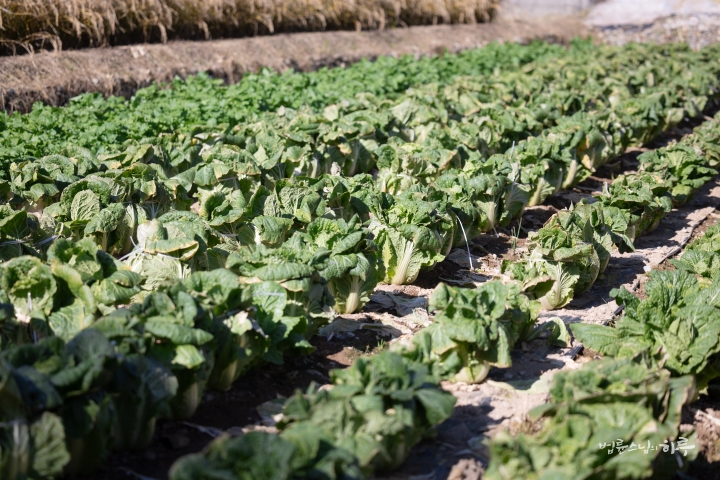
After completing his early morning practice and meditation, Sunim headed to the broadcasting room at Dubuk Jungto Retreat Center for the Leading Members’ Dharma Assembly.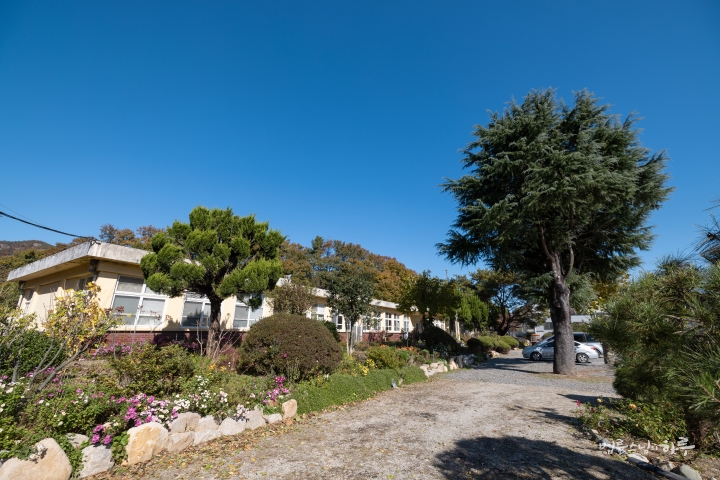
From 8:30 AM, Sunim gathered opinions with the Lay Sangha Dharma Teacher Group about the December closing retreat that will conclude the first 1000-Day Practice and how to approach the Family Day week.
At 10 AM, the Leading Members’ Dharma Assembly began with the recitation of the Three Refuges and the Heart Sutra. With all leading members present in the video conference room, they requested a Dharma talk with three prostrations. Sunim spoke about the rapidly changing times and emphasized the importance of maintaining a stance of practice and responsible action even in these circumstances.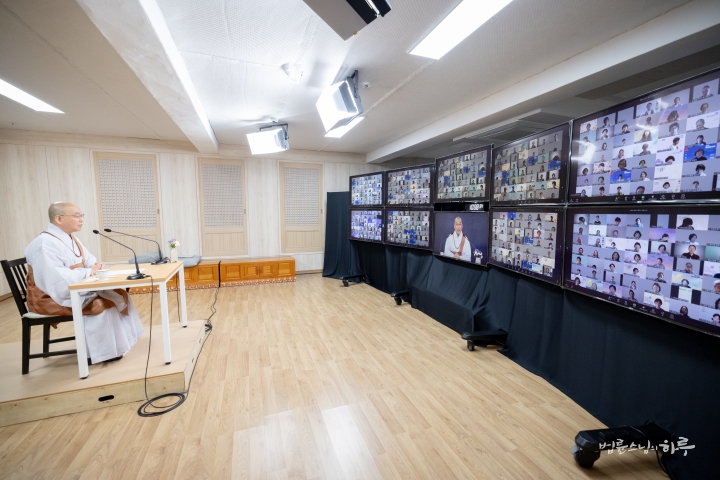
“November has already reached its midpoint. This fall has seen unusually frequent autumn rains, causing many difficulties with the harvest. However, the past week has been clear, allowing most fields to complete their harvesting. The major task remaining is kimchi-making, which will take place between late November and early December. The only crops or vegetables left in the fields now are radishes and cabbages. Here in Dubuk, the harvest has been completed, and this morning we tasted freshly milled new rice. Spring crops are being planted in the harvested rice paddies. Since this area raises a lot of livestock, farmers are diligently planting spring crops like rye for animal feed, though it’s getting late in the season. The day after tomorrow, temperatures are expected to drop below freezing, giving us an early taste of winter. I remember the college entrance exam days used to be very cold, but this year, contrary to past years, the weather is expected to be somewhat milder during the exam period.
For the past three days, the Youth Festival was held at Jungto Social and Cultural Center to inspire hope in young people. Youth volunteers prepared diligently for several months, and thanks to Jungto Society members who volunteered behind the scenes in various areas including the dining hall, the event concluded successfully without major difficulties. There seem to have been meaningful achievements as well. An evaluation meeting is scheduled for next week, and we expect a separate report from the Special Youth Division. I would like to take this opportunity to express my sincere gratitude to the youth volunteers, all Jungto Society members, and everyone who volunteered together. Thank you all for your hard work.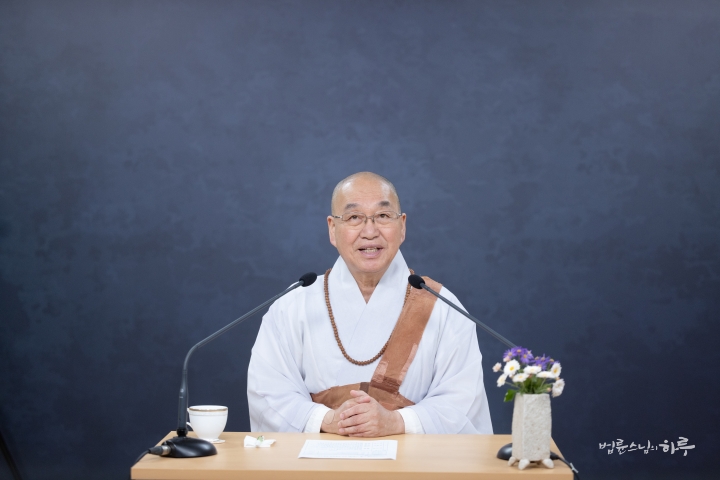
Living as a Practitioner in the Midst of Change
At the end of October and early November, the Asia-Pacific Economic Cooperation (APEC) summit was held in Gyeongju. The event proceeded smoothly, demonstrating that South Korea’s international standing has risen significantly. However, the situation on the Korean Peninsula remains tense. In early November, joint military exercises between South Korea and the United States resumed, and North Korea responded by launching missiles, continuing the tension. While the situation has somewhat eased compared to last year, it is still difficult to speak of stability. If a meeting between U.S. President Trump and North Korean Chairman Kim Jong-un had taken place, it might have helped ease tensions. However, as that meeting did not materialize, the current state of tension continues. Nevertheless, if the South Korean government’s continuous efforts and persuasion toward both the United States and North Korea continue, we can hope that a thaw will come to the Korean Peninsula next spring and tensions between the two Koreas will be further reduced.
Leading members of Jungto Society are taking the lead in various practical activities for society, such as protecting the global environment and helping impoverished neighbors. Along with this, I ask that you, as practitioners, pray with all your heart for peace and unification on the Korean Peninsula. Currently, the war in Ukraine has not yet ended, and while peace negotiations are underway in Gaza, bombings continue. In addition, disputes and conflicts continue around the world, including border disputes between Thailand and Cambodia, civil war in Myanmar, and tensions between India and Pakistan.
This situation can be seen as one aspect of the changing international order. Although negative aspects exist, people are also showing hopeful movements toward a better future. In recent local elections in the United States, there were notable changes in three local government leadership elections. The Republican Party, to which President Trump belongs, lost both the gubernatorial election and the New York City mayoral election. In particular, in the New York City mayoral election, an extraordinary event occurred where a young person in their 30s from a Muslim immigrant background was elected mayor of New York City with its population of 10 million. We are now living in an era of chaos. Not everything is getting worse, and new hope emerges even in the midst of difficulties. At the same time, it can be said that this is an era where, while signs of hope appear, backlash against them also arises. 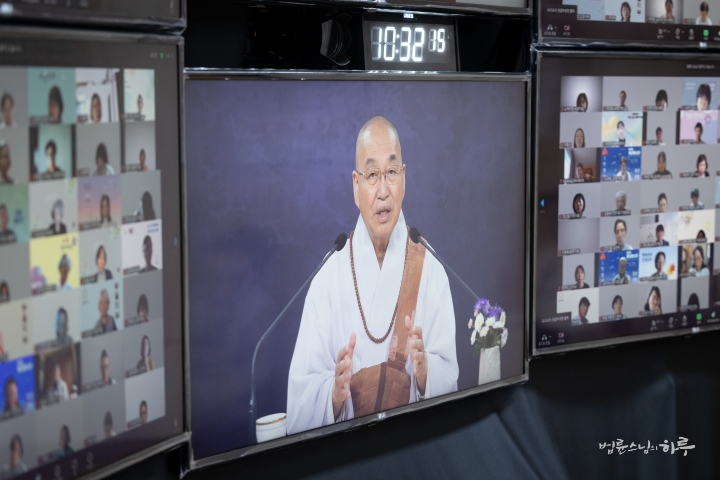
Our society is currently experiencing significant changes in its occupational structure due to the rapid development of artificial intelligence and technology. This has led many people to feel anxious about potentially losing their jobs. While technological progress has positive aspects in enhancing productivity and efficiency, rapid technological advancement is simultaneously having negative effects by deepening the wealth gap across society.
The world always brings cold within warmth. Just as global warming paradoxically intensifies winter’s severe cold, we are now experiencing a period of great upheaval. In times like these, rather than focusing only on the present moment, we need to take a longer view and develop the perspective to see this historical turning point.
Historical turning points can be times of confusion for those who wish to remain in the past, but they can become times of opportunity for those who focus on new possibilities for the future. When society is stable, the environment favors the existing privileged class, but when society is shaken, doors of opportunity open for those attempting new challenges.
In such times of upheaval, we must not forget two perspectives. First, no matter how the world changes, we must recognize that we are the masters of our own lives, maintain equanimity, and not lose sight of the practice perspective of creating our own happiness. Second, if society flows in a negative direction, even though we cannot completely stop that flow, we must play a role in nurturing and spreading positive elements within it. Even if we cannot go against the great currents of our time, I hope you will live as practitioners who carry the hope of creating a more just and peaceful society within those currents. If we live with such perspectives, we will be able to find greater fulfillment and meaning in our lives. 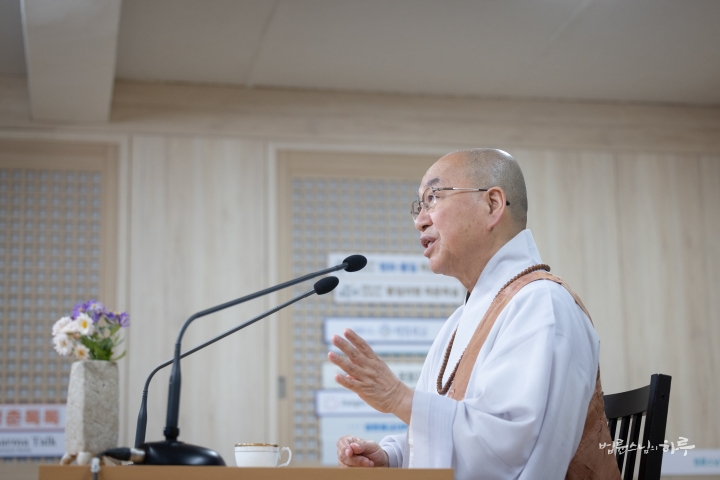
Although we are going through difficult times now, even during the late Joseon period when corrupt officials’ exploitation was at its worst, there were those who dreamed of new reforms. Even during the Japanese colonial period, there were many young people who harbored dreams of independence. During times of absolute poverty, we challenged industrialization with the hope of “living well for once,” and even under the oppression of military dictatorship, we yearned for a free and democratic society. Through the sacrifice and dedication of countless people, we have built today’s Republic of Korea. Our current situation is not one where we should despair because external conditions are excessively bad. While it’s true that there are many challenges, the problem seems to be that we lack the energy to actively respond to these challenges. That’s why we hesitate in the face of current difficulties. Therefore, we must dedicate ourselves even more to self-practice to cultivate the inner strength to live in this era.
The 1000-Day Practice now has only about a month left. Please finish well and continue your dedication during the remaining period. I’ve heard recently that some people have fallen ill from working too hard and are now resting. I hope all of you, including the Secretary General, directors, team leaders, and branch presidents, take good care of your health. Just like mind practice, health must also be regulated and maintained by oneself.
When the 1000-Day Preparation Committee plans for the next three years, please keep two things particularly in mind.
First, it’s important to prioritize the health of members and volunteers and build a system that can substantially support their practice. Second, each individual must also balance their health and dedication. I hope you all become people who fulfill both aspects of health and practice together, without leaning too heavily to one side.”
Following this, leading members asked Sunim questions about things they were curious about while carrying out their activities. For an hour and a half, four people pressed the hand-raising button and had conversations with Sunim. One of them brought up the issue of Korea’s nuclear-powered submarine approval discussed at the recent Gyeongju APEC meeting, asking how to understand this as a Buddhist. Sunim explained what perspective to take when security enhancement and the value of peace collide.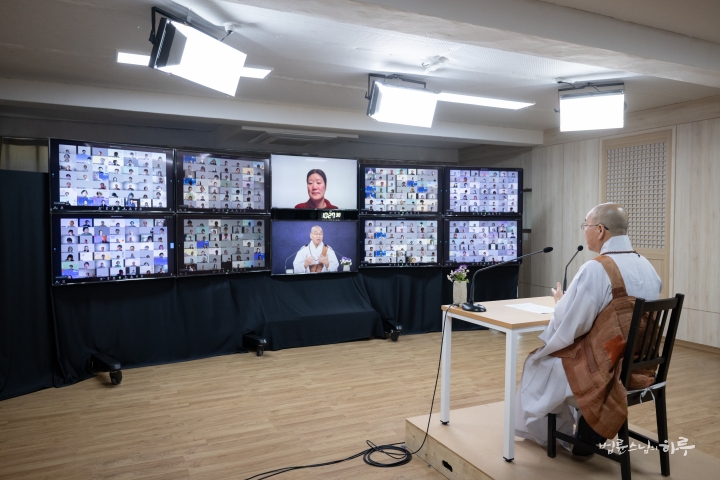
US Approval of Korean Nuclear Submarine: Security Enhancement vs. Sign of War Crisis?
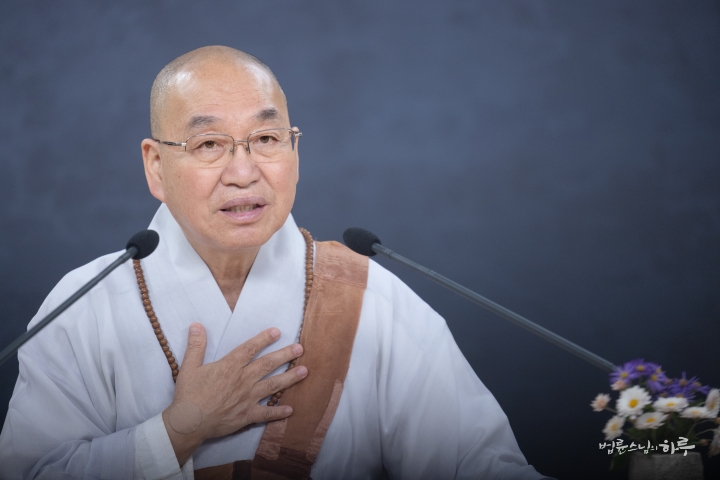
“You have two senses of belonging. One is your belonging as a ‘Buddhist,’ and the other is your belonging as a ‘citizen of the Republic of Korea.’
First, if we consider your belonging as a Buddhist, it should transcend nations. This means going beyond distinctions of whether it’s Korea, Japan, China, or Vietnam. Buddhists should pursue universal human values.
Then what about your position as a citizen of the Republic of Korea? It means having a sense of belonging limited to the time and space of the Republic of Korea and pursuing the interests of this community. Korea’s president also pursues ‘national interest first’ diplomacy, and former US President Trump promoted ‘America First.’ Prioritizing the interests of one’s own community in this way is nationalism.
Individuals generally prioritize their own interests first. Next, they prioritize their family’s interests. Because we prioritize our individual interests, conflicts arise even between spouses and between parents and children. Then what about relationships with neighbors? If a couple becomes one heart and forms a single community of interest, prioritizing family interests can lead to conflicts with neighbors. For example, as seen in regional tensions between Gyeongsang and Jeolla provinces, prioritizing one’s regional interests leads to regional selfishness like ‘we’ll attract factories to our region’ or ‘we’ll make transportation more convenient for our region.’ The next level is national interest-centered thinking that prioritizes our nation’s interests. 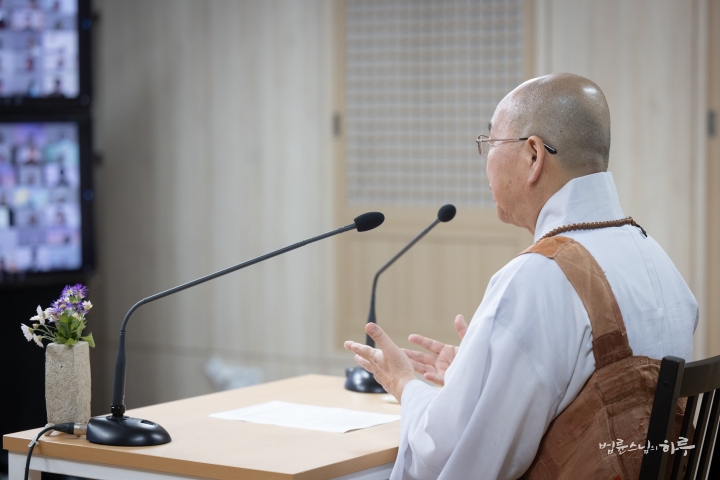
Ideally, we should set aside our own interests and pursue the interests of others, abandon our family’s interests and consider our neighbors’ interests, let go of our region’s interests and think of neighboring regions’ interests, and put aside our country’s interests to pursue the interests of neighboring countries as well. This perspective is both a Buddhist teaching and a way of thinking that brings true peace. However, in reality, most people prioritize their own interests, their family’s interests, their region’s interests, and their country’s interests. This reality creates conflict, and when that conflict escalates into war or major disputes, the pursuit of interests can actually result in losses. It is at such times that universalism becomes even more important.
From a universalist perspective, there should be no armies or conflicts. Yet in reality, conflicts do exist. This is why we face the practical issues of having to defend ourselves, take responsibility for our families, and protect our countries. Monks should place greater emphasis on the universal position. Even among Buddhists, lay practitioners must prioritize national interests, personal interests, and regional interests while still considering the universal position. This is because lay practitioners are members of society.
For example, in Thailand, when someone becomes a monk, they lose their voting rights and their civil rights are restricted. As a result, Thailand has three types of citizens: men, women, and monks. Monks do not participate in political parties or serve in the military. This is because their position requires them to prioritize universal interests. When someone becomes a monk, they are regulated so that they do not need to follow national interests as citizens. However, this is not the case in our country. Monks must serve in the military here. There are views that not serving in the military goes against national interests. Southeast Asian monks cannot understand when they hear that Korean monks serve in the military. They often say, “How can a monk carry a gun?” While we proudly speak of Master Samyeong fighting against Japan during the Imjin War, Southeast Asian monks may not understand the concept of “monks fighting.” 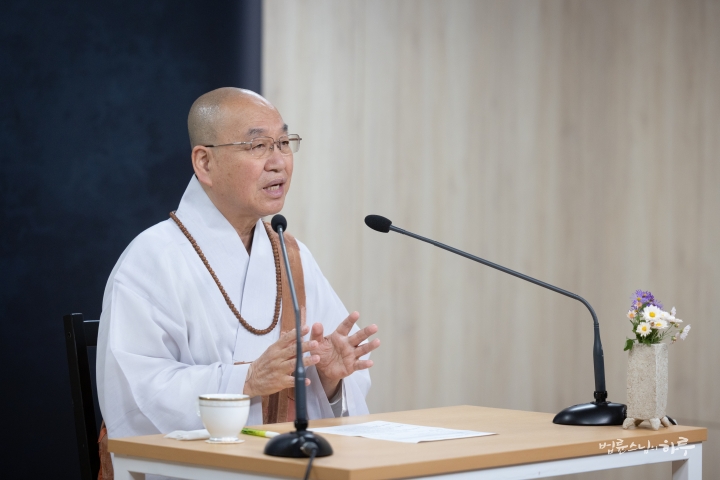
So what should we do when we have these two affiliations simultaneously? As an individual, Sunim should prioritize universal interests. However, when Sunim speaks to the public, he must also consider national interests. In other words, while Sunim personally may oppose nuclear-powered submarines, from a national perspective, nuclear-powered submarines might be deemed necessary for security.
Korea is exporting excellent weapons such as missiles and tanks to other countries through its weapons industry, known as ‘K-Defense.’ I believe that while K-dramas and K-pop can be sources of pride, K-Defense is not something to boast about. If it’s something we must do reluctantly for national interests, we should do it quietly, not advertise it. Those who think about universal interests and peace should at least refrain from boasting about it. If a monk wants to eat meat, he should eat it quietly rather than bragging, ‘I had ribs this time.’ While people in the world boast about how nice their houses and cars are, I don’t think it’s right for ordained monks to boast about jewelry, money, or cars. This doesn’t mean monks cannot possess anything—that wouldn’t align with reality. However, if a monk wants to have something, he should have it quietly rather than advertising and boasting about it. Similarly, K-Defense is not something to boast about. If we need to make money for national interests, we should make money by producing things people truly need rather than making weapons.
From this perspective, these two affiliations conflict with each other. When North Korea develops nuclear weapons, public opinion surges saying ‘we should make them too.’ However, looking at the international situation, especially the Nuclear Non-Proliferation Treaty (NPT), we are not in a position to develop nuclear weapons. If we did, we would have to be prepared to starve like North Korea. Even so, we cannot just sit idle, so from a national standpoint, one might think we should maintain the potential capability to develop nuclear weapons if truly necessary. However, I’m not saying I support this. 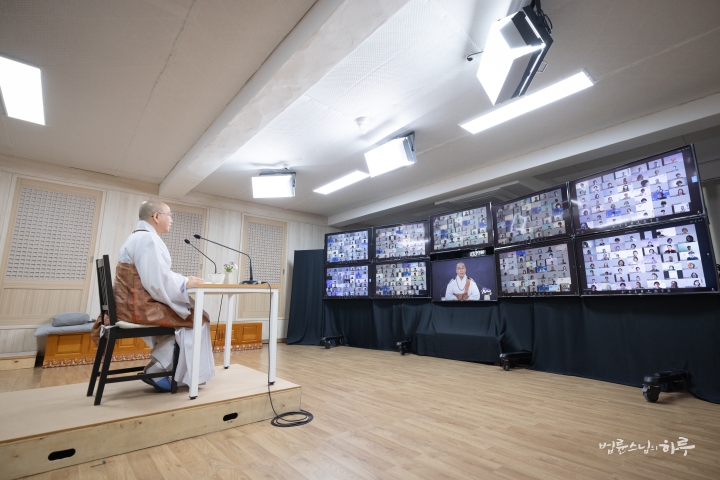
Currently, South Korea has many nuclear power plants and possesses advanced nuclear technology, but has not received permission for nuclear reprocessing. Since spent nuclear fuel cannot be reprocessed, enormous economic losses occur. All raw materials must be imported from abroad, and spent fuel must be sent to France for reprocessing before being brought back. The United States does not permit this due to concerns that South Korea could develop nuclear weapons if it acquires nuclear reprocessing capabilities, given the tensions between North and South Korea. Therefore, South Korea is currently negotiating with the United States regarding nuclear reprocessing. Japan conducts its own nuclear reprocessing. While the Democratic administration in the United States did not allow this, the Trump administration considered permitting it, viewing South Korea’s possession of nuclear technology as a way to share America’s role in East Asia.
Meanwhile, North Korea not only possesses nuclear weapons but is also currently developing nuclear-powered submarines. They are studying by dismantling Russia’s aging submarines. South Korea is not proposing to load nuclear weapons onto submarines. Instead, the goal is to use small nuclear reactor propulsion instead of diesel engines so that submarines can remain quietly underwater for extended periods. South Korea is requesting U.S. permission for this. While South Korea can build the submarines itself, it is asking for permission to use small nuclear reactors for propulsion. For example, in Australia’s case, an order for French diesel submarines was nearly finalized, but when the U.S. and UK allowed Australia to have nuclear-powered submarines, the order was canceled. Therefore, South Korea is also requesting permission to build and use small nuclear reactors as fuel.
Since the United States’ shipbuilding industry has weakened, building submarines would require either Korean technicians going to the United States or building them in Korea. There is a possibility that President Trump might demand that ships be built in the United States in exchange for allowing South Korea to have nuclear-powered submarines. Building submarines in the United States would require constructing new docks and would be extremely expensive. Realistically, building them in Korea would be more efficient. Therefore, negotiations are ongoing regarding this issue. The possibility of allowing nuclear-powered submarines has opened up slightly from a situation where they were previously not permitted.
From security and technological perspectives, some believe that allowing nuclear reprocessing and nuclear-powered submarines would benefit national interests. This is a position that prioritizes security. However, such decisions also carry the risk of escalating arms races and tensions on the Korean Peninsula. If South Korea strengthens its conventional weapons, North Korea will produce more nuclear weapons, and if South Korea builds nuclear-powered submarines, North Korea will have no choice but to further arm itself. Ultimately, both sides will feel threatened and try to secure their safety. Looking only at South Korea, this would strengthen security, but when considering South Korea along with North Korea, Japan, and China, it has the aspect of intensifying the East Asian arms race. Thus, both advantages and disadvantages exist together. 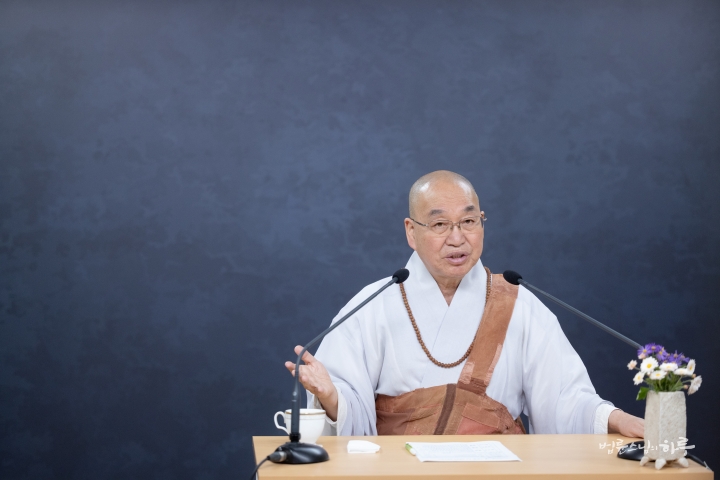
From the perspective of universal human values, tension and arms races should be avoided. However, from a nation’s standpoint, supplementing insufficient security and enhancing military competitiveness can be beneficial. We need to recognize both aspects and accept this issue accordingly. It’s not a matter of simply dividing into right and wrong, or for and against. Those who value universal human values, like peace activists or environmental activists, will oppose it, while those who prioritize national interests will demand and pursue it. The fact that many people in our country support it may mean that while we talk about ‘progressives’ and ‘conservatives,’ in reality, all political forces are conservative. There are hardly any political forces that prioritize universal values; they’re just competing within conservative parties by dividing into ‘progressive and conservative.’ Even the Democratic Party can be seen as a conservative party when it comes to military expansion.”
“Yes, I understand. I felt that rather than determining right and wrong about an issue, it’s more important to think about where to stand. Thank you.”
Questions continued one after another.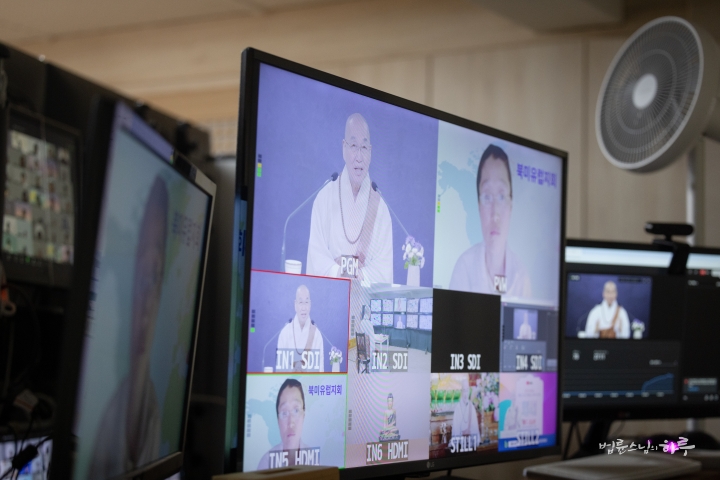
If we add English dubbing to the YouTube channel ‘A Day in the Life of Sunim,’ it would be very helpful for spreading the dharma to foreigners. Would it be possible to mix overseas branches and international divisions to expand exchanges?
I’m curious whether the scope of ‘wrongdoing’ mentioned in Posal includes everyday mistakes. Can small mistakes or regrettable actions also be subjects for repentance?
During class, a student expressed violent fantasies, causing other students to feel fearful. Should we immediately restrict this student’s class participation?
After finishing the dialogue, it was almost 12 o’clock. After concluding the Dharma assembly with the Four Great Vows, leading members gathered in their respective video conference rooms for mindful sharing.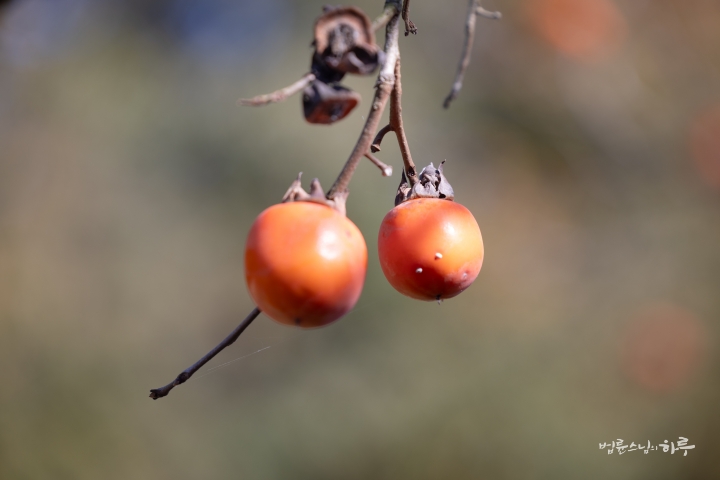
After leaving the broadcasting room, Sunim welcomed old friends. Venerable Dobup, the spiritual leader of Silsangsa Temple, Venerable Jihong, the spiritual leader of Geumgang Jeongsa Temple, and Venerable Sugyeong from Together with the World visited Dubuk Jungto Retreat Center.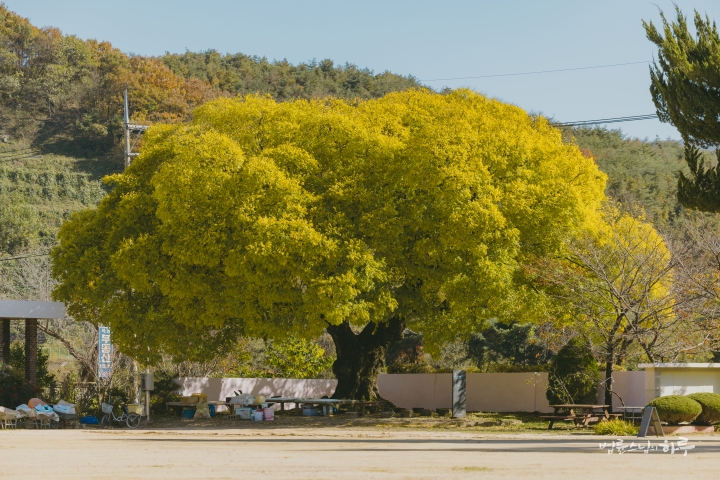
After exchanging warm greetings, they had lunch together and caught up on each other’s news. After conversing throughout the afternoon, they went for a walk to Mt. Namsan in Gyeongju at 4 PM.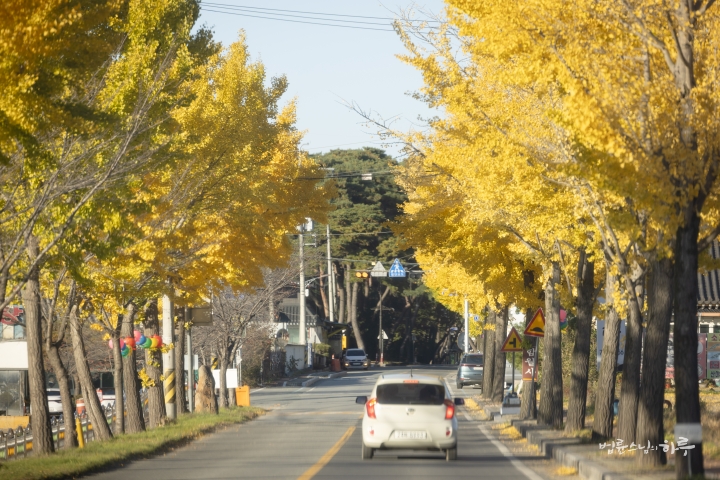
The walk began below Samneung Forest.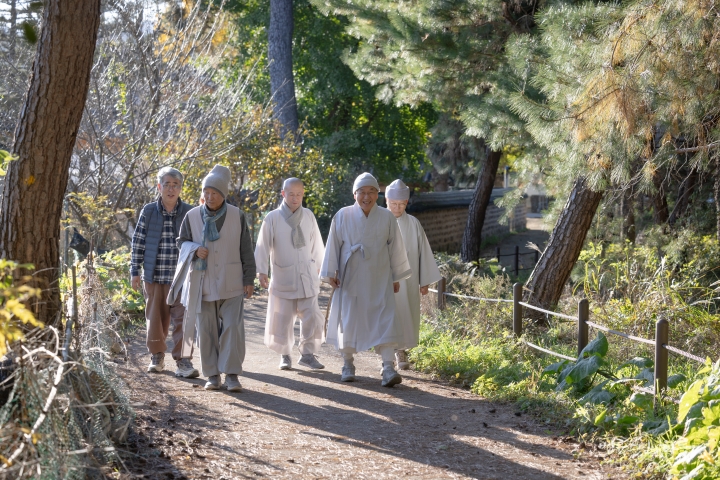
“Last time we went up the valley, but today let’s walk the trail from Samneung to Poseokjeong.”
They passed through King Gyeongae’s tomb and Samneung, where pine forests were thick, and headed toward Mangwolsa Temple.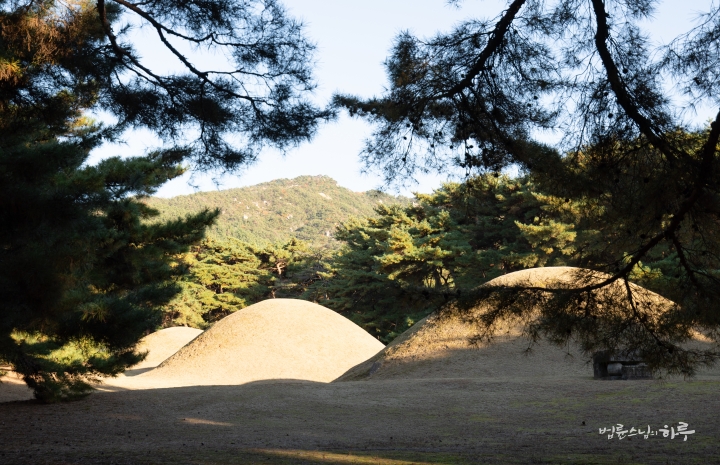
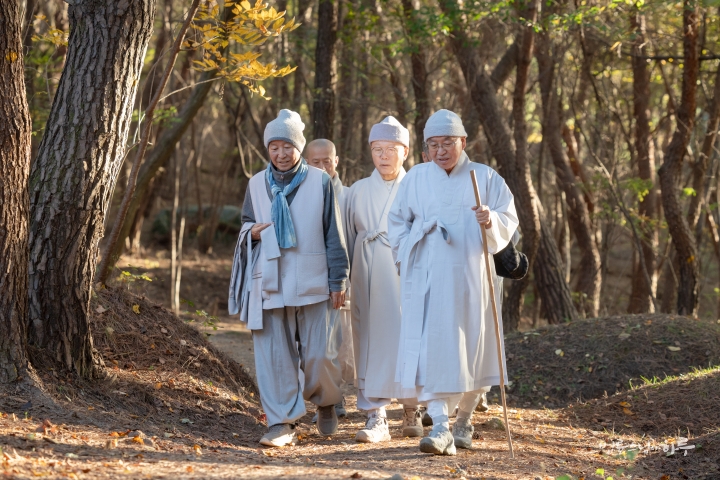
After passing Mangwolsa Temple and reaching Sambulsa Temple, the autumn foliage along the path was at its peak.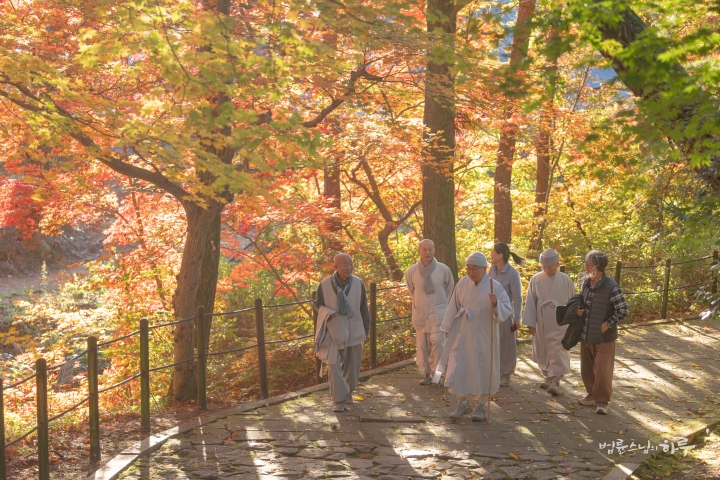
Sunlight sparkled through the red-tinted leaves. They took a photo together beneath them.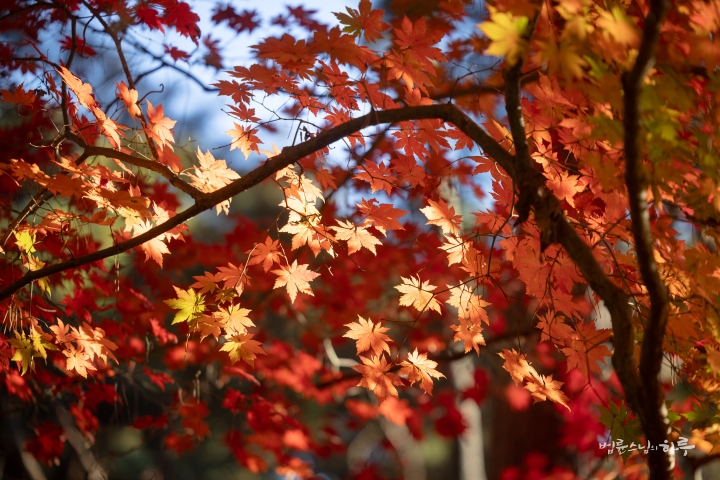
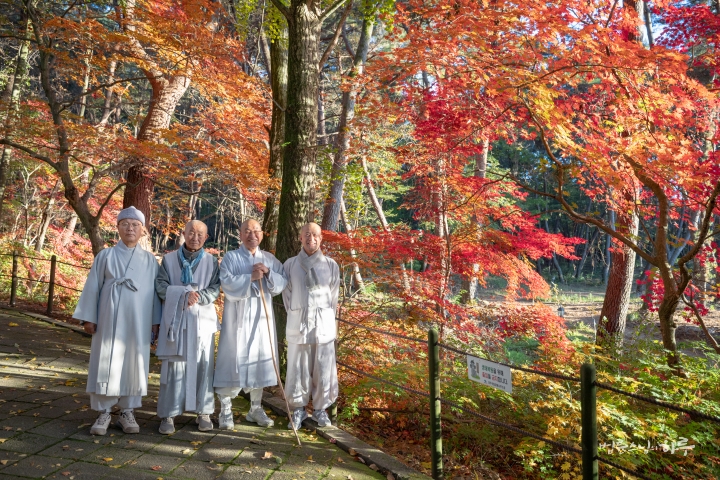
Walking up the autumn foliage path, they paid respects to the Baedong Stone Buddha Triad. The autumn sunlight gently settled over the three Buddhas.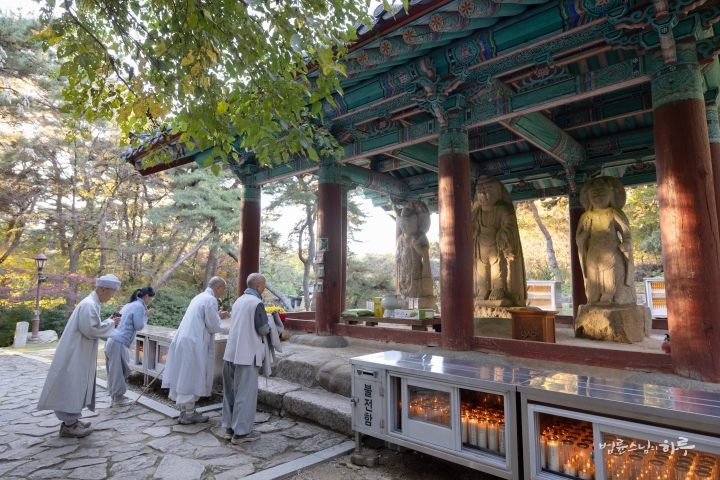
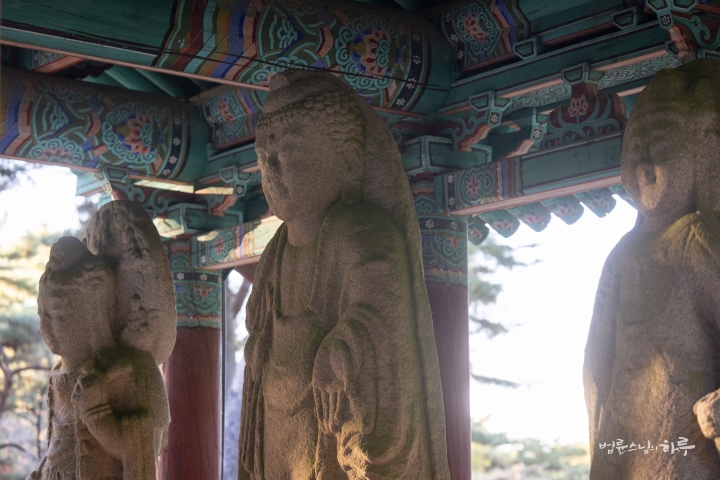
Leaving Sambulsa Temple, they passed by a reservoir. The sun was slowly setting behind the mountains.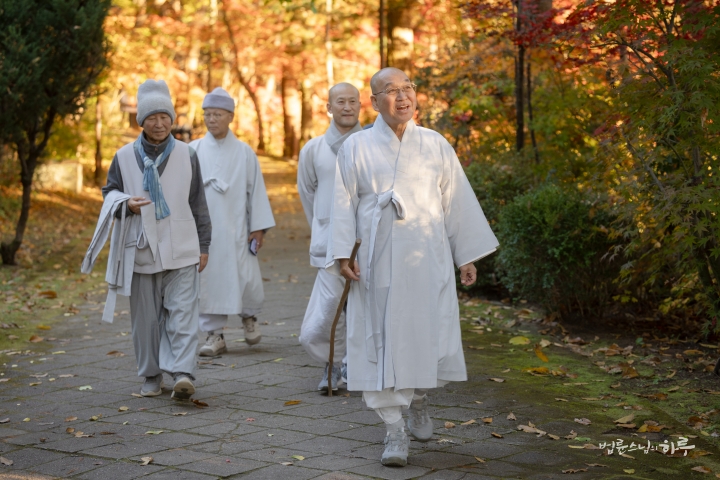
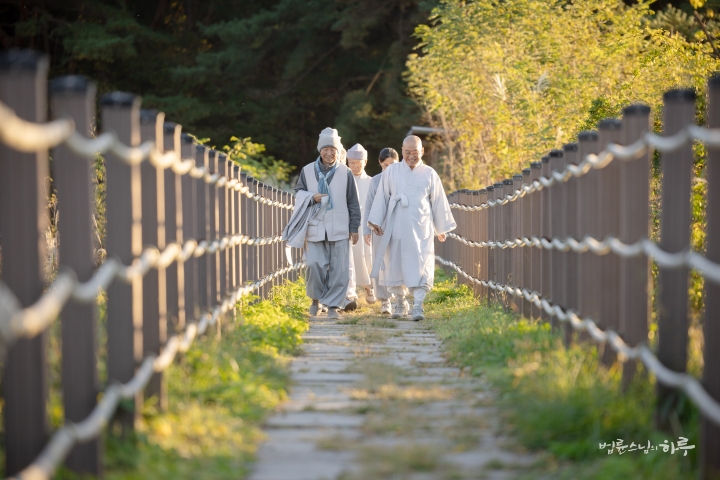
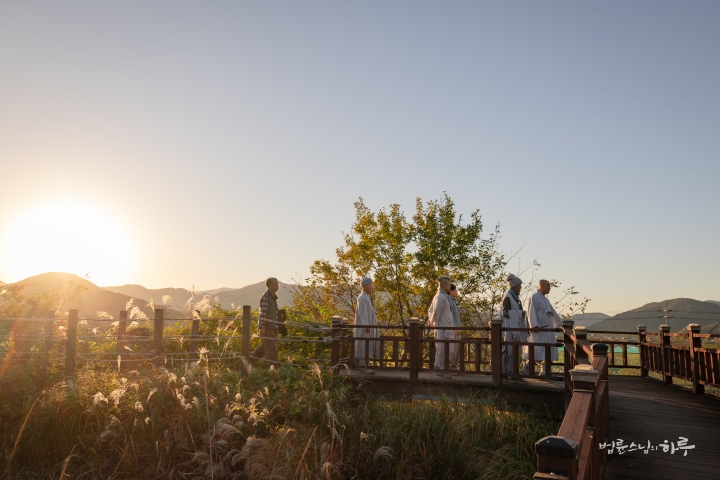
After passing King Jima’s tomb, they arrived at Poseokjeong in about 40 minutes. Poseokjeong was bathed entirely in yellow light.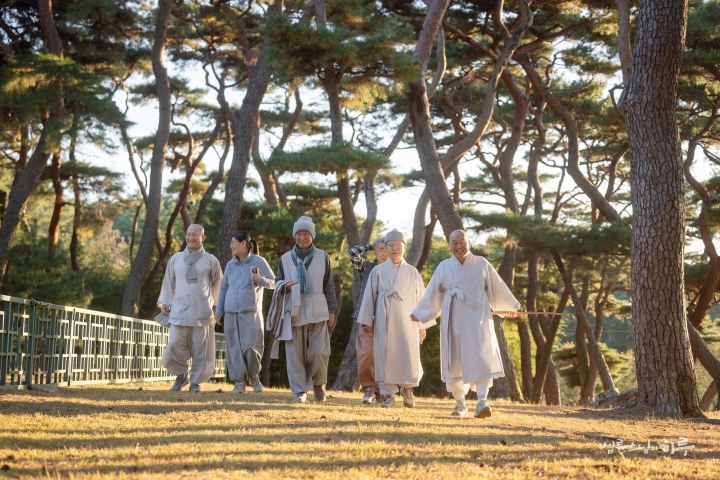
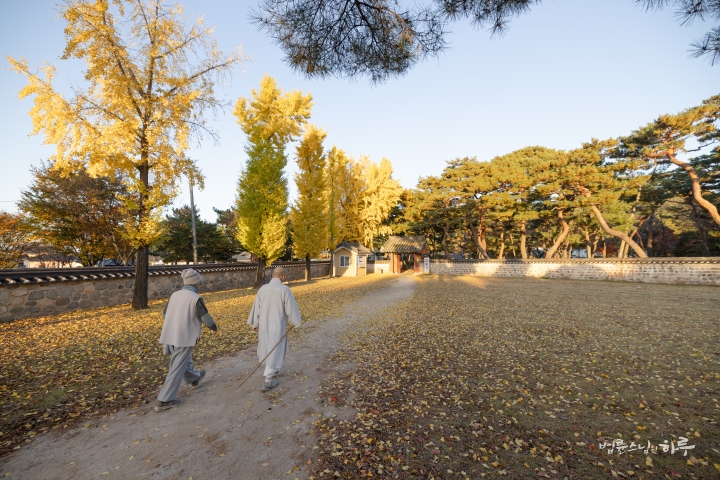
They looked around the site where Silla nobles once floated cups on flowing water, composed poems, and enjoyed refined culture.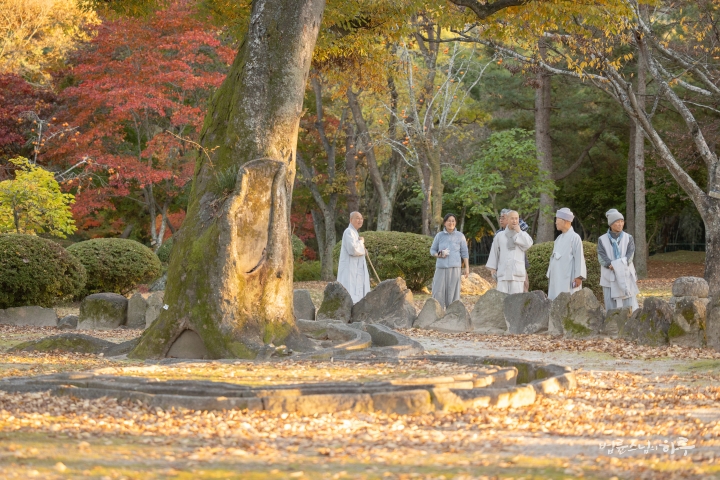
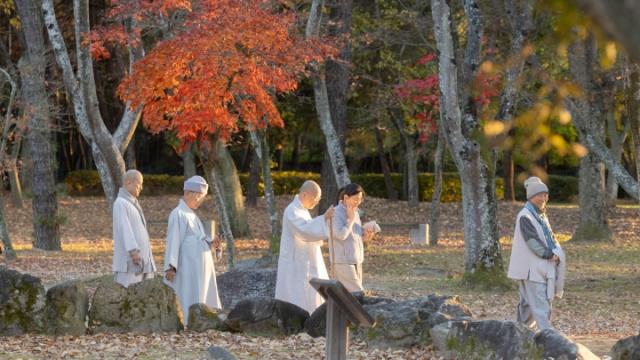
As closing time approached, they stayed briefly before quietly leaving.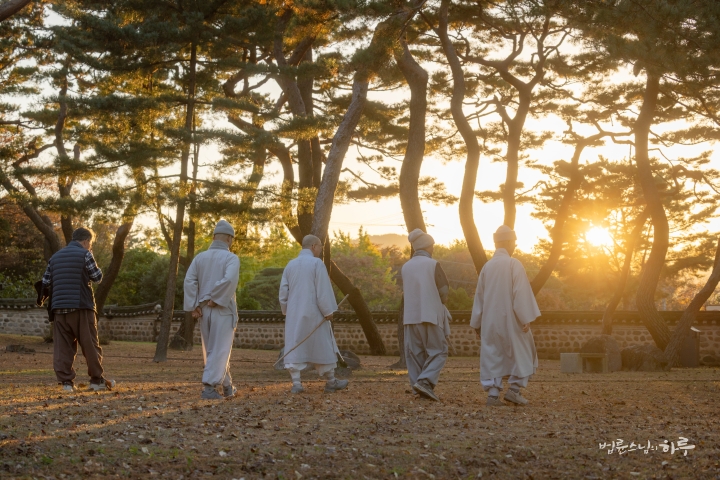
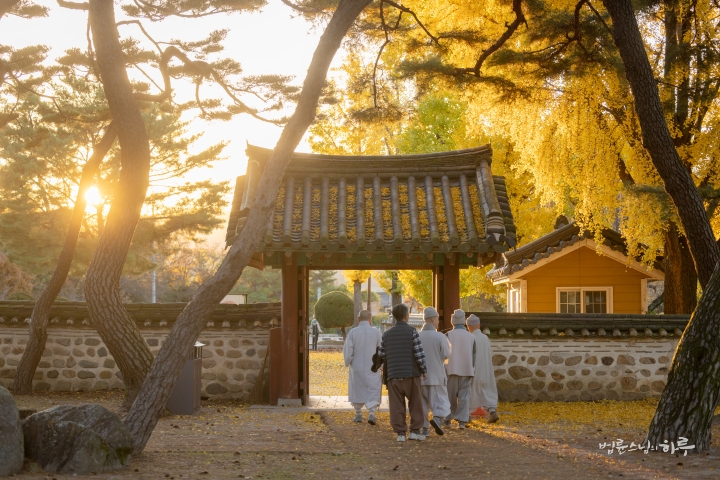
They departed for Dubuk Jungto Retreat Center after 5 PM.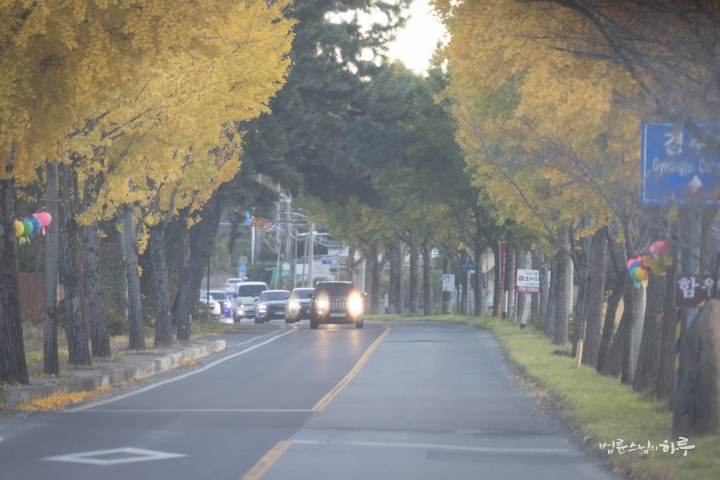
After arriving and having dinner, they engaged in extensive conversations late into the night about the future of Korean Buddhism and how to resolve conflicts in Korean society.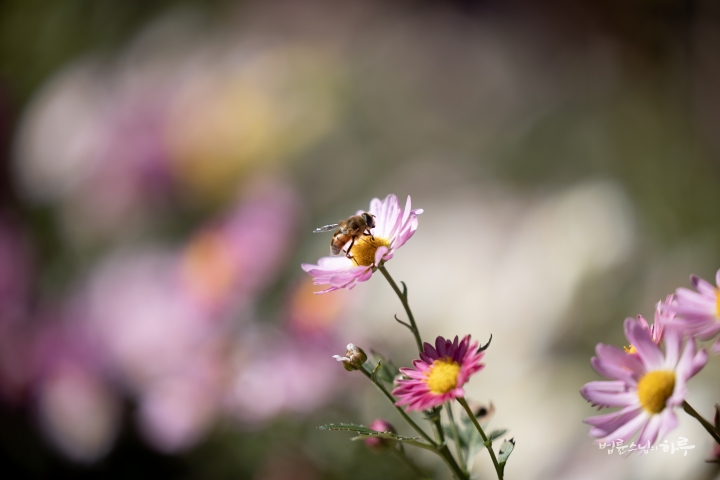
Tomorrow morning, Sunim will visit Unmunsa Temple, Seoknamsa Temple, and Naewonsa Temple, and in the evening, he will have a dialogue with young people from Vietnam.





